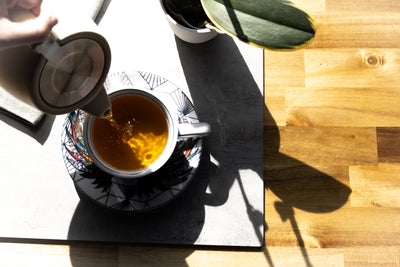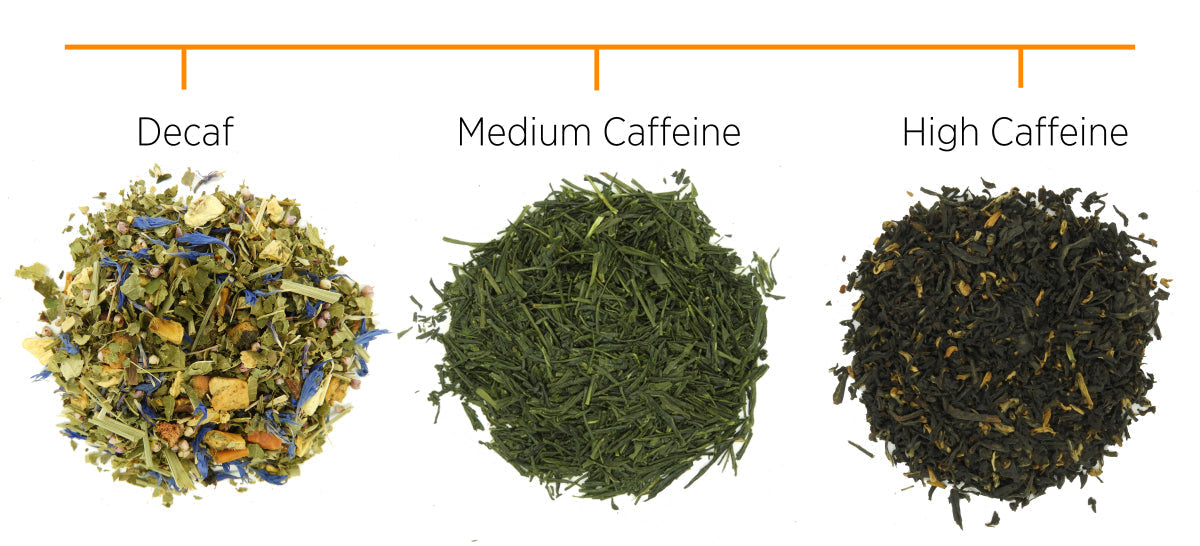Guide to caffeine content in tea
Black tea typically has the most caffeine of all the tea types. One of the reasons for this is a longer infusion time versus green along with higher steeping temperatures, typically boiling. Because black tea is oxidized, it allows more caffeine to be extracted from the leaf versus other types of tea.
There are other influences that can alter the caffeine content in tea, including which part of the plant the leaf comes from, altitude and local conditions, leaf grade, type of tea, fertilizer used, and much more.
As a general rule, the Assamica tea variety is higher in caffeine than other varieties. These are teas grown in India, Africa and Sri Lanka. Assam is a classic example of this tea variety.
The Chinese "camelia" variety of tea leaves tend to be lower in caffeine. Lapsang Souchong is made from lower, older tea leaves, and thus it is among the lowest in terms of caffeine content. Older bushes, typically found in certain areas of China also result in lower caffeine levels. Some shade grown green teas like Gyokuro tend to have higher caffeine levels than their non-shaded cousins.
Caffeine content in tea - does black tea always have the most?
Because there are a myriad of ways caffeine is measured and when its measured - its hard to say which tea variety has the absolute highest and lowest amount of caffeine. There are literally dozens of factors that make up the caffeine content in tea, and any tea company can seize one aspect and declare that this is the highest caffeine tea you can buy, when it might be taking data from a particular moment in time that is 'ideal' but changes later when it is being processed. Another trick to alter the caffeine content in tea, as well as coffee is to simply adjust the serving size.
At the end of the day - drinking black tea will yield the highest caffeine as a rule of thumb, with green and white teas having lower amounts. Will there be enough variation between one type of black tea versus another to make a noticeable difference? Probably not that you will notice. And don't forget, there are other components in tea that affect how caffeine is processed within your body. EGCG, L-theanine are found in tea in varying amounts - and these too can increase concentration and awareness without giving you a caffeine buzz.
Caffeine recommended daily limits
Daily recommended caffeine should be about 400 milligrams, which is 4 "cups" of coffee, but cups being 8 ounces, it really means 2 large cups to a lot of people. With black tea coming in around half the caffeine as coffee (45 per cup versus 90 for coffee) you can enjoy a lot more tea throughout the day.
Caffeine content in white, green and oolong tea
These teas have lower amounts of caffeine, but also higher amounts of anti-oxidants like EGCG. Anti-oxidants will also provide a mild form of stimulation, which is why it has been traditionally used by monks for long periods of meditation. In general the range can be from 10-30mg per cup.
Caffeine content in herbal tea
You might be thinking - herbal tea has no caffeine, right? That is not the case. There are some herbs that have caffeine, in fact they have more caffeine than tea. The two most popular herbs in this category are Guayusa and Yerba Mate. Both these herbs contain around 85mg or more per 8oz serving.
Teas to try for energy
Our recommendations are to get strong black teas (the Assam variety) that are also finer cut. This allows more caffeine to infuse into the cup. But there are also blends that contain both tea and caffeine containing herbs. We recommend you give these a try. We've created the list below to represent some of the strongest and highest caffeinated teas you can buy.
Happy Tea
Happy Tea contains Guayusa, which is very similar to Yerba Mate. Like yerba mate, it has a caffeinated leaf. A cup of tea with guayusa has around 40mg of caffeine.
Yerba Mate
Yerba mate is a popular South American beverage known for its unique flavor and energizing properties, providing a raw caffeine punch, but not in overwhelming amounts.
Yerba Mate Blends
These blends contain Yerba Mate and other energizing ingredients, formulated to provide you with just the right amount of caffeine without being as aggressive as a cup of coffee.
Matcha
Matcha is derived from green tea leaves grinded into a fine powder. Rather than being infused in water and then strained out, it's mixed into the water and consumed entirely. This process results in a much larger amount of caffeine - about 60-70mg per 8oz cup!





